
Twelve Olympians
Encyclopedia
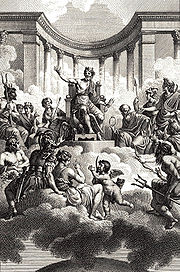
Greek mythology
Greek mythology is the body of myths and legends belonging to the ancient Greeks, concerning their gods and heroes, the nature of the world, and the origins and significance of their own cult and ritual practices. They were a part of religion in ancient Greece...
, were the principal deities
Deity
A deity is a recognized preternatural or supernatural immortal being, who may be thought of as holy, divine, or sacred, held in high regard, and respected by believers....
of the Greek pantheon
Pantheon (gods)
A pantheon is a set of all the gods of a particular polytheistic religion or mythology.Max Weber's 1922 opus, Economy and Society discusses the link between a...
, residing atop Mount Olympus
Mount Olympus
Mount Olympus is the highest mountain in Greece, located on the border between Thessaly and Macedonia, about 100 kilometres away from Thessaloniki, Greece's second largest city. Mount Olympus has 52 peaks. The highest peak Mytikas, meaning "nose", rises to 2,917 metres...
. Zeus
Zeus
In the ancient Greek religion, Zeus was the "Father of Gods and men" who ruled the Olympians of Mount Olympus as a father ruled the family. He was the god of sky and thunder in Greek mythology. His Roman counterpart is Jupiter and his Etruscan counterpart is Tinia.Zeus was the child of Cronus...
, Hera
Hera
Hera was the wife and one of three sisters of Zeus in the Olympian pantheon of Greek mythology and religion. Her chief function was as the goddess of women and marriage. Her counterpart in the religion of ancient Rome was Juno. The cow and the peacock were sacred to her...
, Poseidon
Poseidon
Poseidon was the god of the sea, and, as "Earth-Shaker," of the earthquakes in Greek mythology. The name of the sea-god Nethuns in Etruscan was adopted in Latin for Neptune in Roman mythology: both were sea gods analogous to Poseidon...
, Demeter
Demeter
In Greek mythology, Demeter is the goddess of the harvest, who presided over grains, the fertility of the earth, and the seasons . Her common surnames are Sito as the giver of food or corn/grain and Thesmophoros as a mark of the civilized existence of agricultural society...
, Hestia
Hestia
In Greek mythology Hestia , first daughter of Cronus and Rhea , is the virgin goddess of the hearth, architecture, and of the right ordering of domesticity and the family. She received the first offering at every sacrifice in the household. In the public domain, the hearth of the prytaneum...
, and Hades
Hades
Hades , Hadēs, originally , Haidēs or , Aidēs , meaning "the unseen") was the ancient Greek god of the underworld. The genitive , Haidou, was an elision to denote locality: "[the house/dominion] of Hades". Eventually, the nominative came to designate the abode of the dead.In Greek mythology, Hades...
were siblings. Ares
Ares
Ares is the Greek god of war. He is one of the Twelve Olympians, and the son of Zeus and Hera. In Greek literature, he often represents the physical or violent aspect of war, in contrast to the armored Athena, whose functions as a goddess of intelligence include military strategy and...
, Hermes
Hermes
Hermes is the great messenger of the gods in Greek mythology and a guide to the Underworld. Hermes was born on Mount Kyllini in Arcadia. An Olympian god, he is also the patron of boundaries and of the travelers who cross them, of shepherds and cowherds, of the cunning of thieves, of orators and...
, Hephaestus
Hephaestus
Hephaestus was a Greek god whose Roman equivalent was Vulcan. He is the son of Zeus and Hera, the King and Queen of the Gods - or else, according to some accounts, of Hera alone. He was the god of technology, blacksmiths, craftsmen, artisans, sculptors, metals, metallurgy, fire and volcanoes...
, Athena
Athena
In Greek mythology, Athena, Athenê, or Athene , also referred to as Pallas Athena/Athene , is the goddess of wisdom, courage, inspiration, civilization, warfare, strength, strategy, the arts, crafts, justice, and skill. Minerva, Athena's Roman incarnation, embodies similar attributes. Athena is...
, Apollo
Apollo
Apollo is one of the most important and complex of the Olympian deities in Greek and Roman mythology...
, and Artemis
Artemis
Artemis was one of the most widely venerated of the Ancient Greek deities. Her Roman equivalent is Diana. Some scholars believe that the name and indeed the goddess herself was originally pre-Greek. Homer refers to her as Artemis Agrotera, Potnia Theron: "Artemis of the wildland, Mistress of Animals"...
were children of Zeus. Some versions of the myths state that Athena was born of Zeus alone, or that Hephaestus was born of Hera alone. The Olympians gained their supremacy in a war of gods
Titanomachy
In Greek mythology, the Titanomachy or War of the Titans , was the ten-year series of battles fought in Thessaly between the two camps of deities long before the existence of mankind: the Titans, based on Mount Othrys, and the Olympians, who would come to reign on Mount Olympus...
in which Zeus led his siblings to victory over the Titans
Titan (mythology)
In Greek mythology, the Titans were a race of powerful deities, descendants of Gaia and Uranus, that ruled during the legendary Golden Age....
.
The first ancient reference of religious ceremonies for them is found in the Homeric Hymn to Hermes.
The Greek cult of the Twelve Olympians can be traced to the 6th century BC Athens and probably has no precedent in the Mycenaean period. The altar to the Twelve Olympians at Athens is usually dated to the archonship of the younger Pesistratos, in 522/521 BC.
The concept of the "Twelve Gods" is older than any of our Greek or Roman sources, and is likely of Anatolian
Anatolian
Anatolian means of or pertaining to Anatolia, or a person from Anatolia, including:Geography*Anatolian:of or pertaining to the region Anatolia.Biology* Anatolian Black, a breed of cattle* Anatolian buffalo, a domestic animal of Anatolia...
origin. There seems to have been a great deal of fluidity when it came to who was counted among their number in antiquity.
The classical scheme of the Twelve Olympians (the Canonical Twelve of art and poetry) comprises the following gods:
- ZeusZeusIn the ancient Greek religion, Zeus was the "Father of Gods and men" who ruled the Olympians of Mount Olympus as a father ruled the family. He was the god of sky and thunder in Greek mythology. His Roman counterpart is Jupiter and his Etruscan counterpart is Tinia.Zeus was the child of Cronus...
, HeraHeraHera was the wife and one of three sisters of Zeus in the Olympian pantheon of Greek mythology and religion. Her chief function was as the goddess of women and marriage. Her counterpart in the religion of ancient Rome was Juno. The cow and the peacock were sacred to her...
, PoseidonPoseidonPoseidon was the god of the sea, and, as "Earth-Shaker," of the earthquakes in Greek mythology. The name of the sea-god Nethuns in Etruscan was adopted in Latin for Neptune in Roman mythology: both were sea gods analogous to Poseidon...
, DemeterDemeterIn Greek mythology, Demeter is the goddess of the harvest, who presided over grains, the fertility of the earth, and the seasons . Her common surnames are Sito as the giver of food or corn/grain and Thesmophoros as a mark of the civilized existence of agricultural society...
, AthenaAthenaIn Greek mythology, Athena, Athenê, or Athene , also referred to as Pallas Athena/Athene , is the goddess of wisdom, courage, inspiration, civilization, warfare, strength, strategy, the arts, crafts, justice, and skill. Minerva, Athena's Roman incarnation, embodies similar attributes. Athena is...
, DionysusDionysusDionysus was the god of the grape harvest, winemaking and wine, of ritual madness and ecstasy in Greek mythology. His name in Linear B tablets shows he was worshipped from c. 1500—1100 BC by Mycenean Greeks: other traces of Dionysian-type cult have been found in ancient Minoan Crete...
, ApolloApolloApollo is one of the most important and complex of the Olympian deities in Greek and Roman mythology...
, ArtemisArtemisArtemis was one of the most widely venerated of the Ancient Greek deities. Her Roman equivalent is Diana. Some scholars believe that the name and indeed the goddess herself was originally pre-Greek. Homer refers to her as Artemis Agrotera, Potnia Theron: "Artemis of the wildland, Mistress of Animals"...
, AresAresAres is the Greek god of war. He is one of the Twelve Olympians, and the son of Zeus and Hera. In Greek literature, he often represents the physical or violent aspect of war, in contrast to the armored Athena, whose functions as a goddess of intelligence include military strategy and...
, AphroditeAphroditeAphrodite is the Greek goddess of love, beauty, pleasure, and procreation.Her Roman equivalent is the goddess .Historically, her cult in Greece was imported from, or influenced by, the cult of Astarte in Phoenicia....
, HephaestusHephaestusHephaestus was a Greek god whose Roman equivalent was Vulcan. He is the son of Zeus and Hera, the King and Queen of the Gods - or else, according to some accounts, of Hera alone. He was the god of technology, blacksmiths, craftsmen, artisans, sculptors, metals, metallurgy, fire and volcanoes...
and HermesHermesHermes is the great messenger of the gods in Greek mythology and a guide to the Underworld. Hermes was born on Mount Kyllini in Arcadia. An Olympian god, he is also the patron of boundaries and of the travelers who cross them, of shepherds and cowherds, of the cunning of thieves, of orators and...
.
Hades
Hades
Hades , Hadēs, originally , Haidēs or , Aidēs , meaning "the unseen") was the ancient Greek god of the underworld. The genitive , Haidou, was an elision to denote locality: "[the house/dominion] of Hades". Eventually, the nominative came to designate the abode of the dead.In Greek mythology, Hades...
(Roman: Pluto
Pluto (mythology)
In ancient Greek religion and myth, Pluto was a name for the ruler of the underworld; the god was also known as Hades, a name for the underworld itself...
) was not generally included in this list. He did not have a seat in the pantheon because he spent almost all of his time in the underworld
Greek underworld
The Greek underworld was made up of various realms believed to lie beneath the earth or at its farthest reaches.This includes:* The great pit of Tartarus, originally the exclusive prison of the old Titan gods, it later came to be the dungeon home of damned souls.* The land of the dead ruled by the...
, in which he was the king.
The respective Roman scheme
Dii Consentes
The Dii Consentes were a list of twelve major deities, six gods and six goddesses, in the pantheon of Ancient Rome. Their gilt statues stood in the Forum, later apparently in the Porticus Deorum Consentium....
as given by Ennius
Ennius
Quintus Ennius was a writer during the period of the Roman Republic, and is often considered the father of Roman poetry. He was of Calabrian descent...
gives the Roman equivalents of these Greek gods, but replaces Dionysus (Bacchus) with Hestia (Vesta
Vesta (mythology)
Vesta was the virgin goddess of the hearth, home, and family in Roman religion. Vesta's presence was symbolized by the sacred fire that burned at her hearth and temples...
) so as to list six gods and six goddesses.
The difference in the list is explained by the story that when Dionysus was offered a seat among the Olympians, the total number of Olympians became thirteen. Believing this would create a fight amongst the gods, Hestia selflessly stepped down, and is sometimes considered a minor god because of this.
Herodotus
Herodotus
Herodotus was an ancient Greek historian who was born in Halicarnassus, Caria and lived in the 5th century BC . He has been called the "Father of History", and was the first historian known to collect his materials systematically, test their accuracy to a certain extent and arrange them in a...
included in his Dodekatheon the following deities: Zeus, Hera, Poseidon, Hermes, Athena, Apollo, Alpheus, Cronus
Cronus
In Greek mythology, Cronus or Kronos was the leader and the youngest of the first generation of Titans, divine descendants of Gaia, the earth, and Uranus, the sky...
, Rhea
Rhea (mythology)
Rhea was the Titaness daughter of Uranus, the sky, and Gaia, the earth, in Greek mythology. She was known as "the mother of gods". In earlier traditions, she was strongly associated with Gaia and Cybele, the Great Goddess, and was later seen by the classical Greeks as the mother of the Olympian...
and the Charites
Charites
In Greek mythology, a Charis is one of several Charites , goddesses of charm, beauty, nature, human creativity and fertility. They ordinarily numbered three, from youngest to oldest: Aglaea , Euphrosyne , and Thalia . In Roman mythology they were known as the Gratiae, the "Graces"...
.
Herodotus
Herodotus
Herodotus was an ancient Greek historian who was born in Halicarnassus, Caria and lived in the 5th century BC . He has been called the "Father of History", and was the first historian known to collect his materials systematically, test their accuracy to a certain extent and arrange them in a...
also includes Heracles
Heracles
Heracles ,born Alcaeus or Alcides , was a divine hero in Greek mythology, the son of Zeus and Alcmene, foster son of Amphitryon and great-grandson of Perseus...
as one of the Twelve.
Lucian
Lucian
Lucian of Samosata was a rhetorician and satirist who wrote in the Greek language. He is noted for his witty and scoffing nature.His ethnicity is disputed and is attributed as Assyrian according to Frye and Parpola, and Syrian according to Joseph....
also includes Heracles and Asclepius
Asclepius
Asclepius is the God of Medicine and Healing in ancient Greek religion. Asclepius represents the healing aspect of the medical arts; his daughters are Hygieia , Iaso , Aceso , Aglæa/Ægle , and Panacea...
as members of the Twelve, without explaining which two had to give way for them.
At Kos, Heracles and Dionysus
Dionysus
Dionysus was the god of the grape harvest, winemaking and wine, of ritual madness and ecstasy in Greek mythology. His name in Linear B tablets shows he was worshipped from c. 1500—1100 BC by Mycenean Greeks: other traces of Dionysian-type cult have been found in ancient Minoan Crete...
are added to the Twelve, and Ares and Hephaestus are left behind. However, Pindar
Pindar
Pindar , was an Ancient Greek lyric poet. Of the canonical nine lyric poets of ancient Greece, his work is the best preserved. Quintilian described him as "by far the greatest of the nine lyric poets, in virtue of his inspired magnificence, the beauty of his thoughts and figures, the rich...
, Apollodorus
Apollodorus
Apollodorus of Athens son of Asclepiades, was a Greek scholar and grammarian. He was a pupil of Diogenes of Babylon, Panaetius the Stoic, and the grammarian Aristarchus of Samothrace...
, and Herodorus disagree with this. For them Heracles is not one of the Twelve Gods, but the one who established their cult.
Hebe
Hebe (mythology)
In Greek mythology, Hēbē is the goddess of youth . She is the daughter of Zeus and Hera. Hebe was the cupbearer for the gods and goddesses of Mount Olympus, serving their nectar and ambrosia, until she was married to Heracles ; her successor was the young Trojan prince Ganymede...
, Helios, Eros
Eros
Eros , in Greek mythology, was the Greek god of love. His Roman counterpart was Cupid . Some myths make him a primordial god, while in other myths, he is the son of Aphrodite....
(a.k.a. Cupid), Selene
Selene
In Greek mythology, Selene was an archaic lunar deity and the daughter of the Titans Hyperion and Theia. In Roman mythology, the moon goddess is called Luna, Latin for "moon"....
and Persephone
Persephone
In Greek mythology, Persephone , also called Kore , is the daughter of Zeus and the harvest-goddess Demeter, and queen of the underworld; she was abducted by Hades, the god-king of the underworld....
are other important gods and goddesses which are sometimes included in a group of twelve. Eros
Eros
Eros , in Greek mythology, was the Greek god of love. His Roman counterpart was Cupid . Some myths make him a primordial god, while in other myths, he is the son of Aphrodite....
is often depicted alongside the other twelve, especially his mother Aphrodite, but is rarely considered one of the Olympians.
Plato
Plato
Plato , was a Classical Greek philosopher, mathematician, student of Socrates, writer of philosophical dialogues, and founder of the Academy in Athens, the first institution of higher learning in the Western world. Along with his mentor, Socrates, and his student, Aristotle, Plato helped to lay the...
connected the Twelve Olympians with the twelve months, and proposed that the final month be devoted to rites in honor of Hades
Hades
Hades , Hadēs, originally , Haidēs or , Aidēs , meaning "the unseen") was the ancient Greek god of the underworld. The genitive , Haidou, was an elision to denote locality: "[the house/dominion] of Hades". Eventually, the nominative came to designate the abode of the dead.In Greek mythology, Hades...
and the spirits of the dead, implying that he considered Hades
Hades
Hades , Hadēs, originally , Haidēs or , Aidēs , meaning "the unseen") was the ancient Greek god of the underworld. The genitive , Haidou, was an elision to denote locality: "[the house/dominion] of Hades". Eventually, the nominative came to designate the abode of the dead.In Greek mythology, Hades...
to be one of the Twelve. Hades is phased out in later groupings due to his chthonic
Chthonic
Chthonic designates, or pertains to, deities or spirits of the underworld, especially in relation to Greek religion. The Greek word khthon is one of several for "earth"; it typically refers to the interior of the soil, rather than the living surface of the land or the land as territory...
associations. In Phaedrus Plato aligns the Twelve with the Zodiac and would exclude Hestia from their rank.
In ancient Greek culture the "Olympian Gods" and the "Cults of Twelve Gods" were often relatively distinct concepts.
Classical Olympians
The twelve gods and goddesses listed among the Twelve most often.| Greek Name | |Image | |Generation | ||
|---|---|---|---|---|
| Zeus Zeus In the ancient Greek religion, Zeus was the "Father of Gods and men" who ruled the Olympians of Mount Olympus as a father ruled the family. He was the god of sky and thunder in Greek mythology. His Roman counterpart is Jupiter and his Etruscan counterpart is Tinia.Zeus was the child of Cronus... |
Jupiter Jupiter (mythology) In ancient Roman religion and myth, Jupiter or Jove is the king of the gods, and the god of the sky and thunder. He is the equivalent of Zeus in the Greek pantheon.... |
King of the gods and ruler of Mount Olympus Mount Olympus Mount Olympus is the highest mountain in Greece, located on the border between Thessaly and Macedonia, about 100 kilometres away from Thessaloniki, Greece's second largest city. Mount Olympus has 52 peaks. The highest peak Mytikas, meaning "nose", rises to 2,917 metres... ; god of the sky and thunder. Youngest child of the Titans Cronus and Rhea. Symbols include the thunderbolt, eagle, oak tree, scepter and scales. Brother and husband of Hera, although he had many lovers. |
First | |
| Hera Hera Hera was the wife and one of three sisters of Zeus in the Olympian pantheon of Greek mythology and religion. Her chief function was as the goddess of women and marriage. Her counterpart in the religion of ancient Rome was Juno. The cow and the peacock were sacred to her... |
Juno Juno (mythology) Juno is an ancient Roman goddess, the protector and special counselor of the state. She is a daughter of Saturn and sister of the chief god Jupiter and the mother of Mars and Vulcan. Juno also looked after the women of Rome. Her Greek equivalent is Hera... |
 |
Queen of the gods and the goddess of marriage and family. Symbols include the peacock, pomegranate, crown, cuckoo, lion and cow. Youngest daughter of Cronus and Rhea. Wife and sister of Zeus. Being the goddess of marriage, she frequently tried to get revenge on Zeus' lovers and their children. | First |
| Poseidon Poseidon Poseidon was the god of the sea, and, as "Earth-Shaker," of the earthquakes in Greek mythology. The name of the sea-god Nethuns in Etruscan was adopted in Latin for Neptune in Roman mythology: both were sea gods analogous to Poseidon... |
Neptune Neptune (mythology) Neptune was the god of water and the sea in Roman mythology and religion. He is analogous with, but not identical to, the Greek god Poseidon. In the Greek-influenced tradition, Neptune was the brother of Jupiter and Pluto, each of them presiding over one of the three realms of the universe,... |
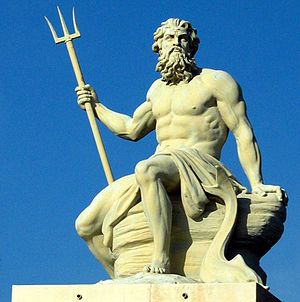 |
Lord of the seas, earthquakes and horses. Symbols include the horse, bull, dolphin and trident. Middle son of Cronus and Rhea. Brother of Zeus and Hades. Married to the Nereid Amphitrite Amphitrite In ancient Greek mythology, Amphitrite was a sea-goddess and wife of Poseidon. Under the influence of the Olympian pantheon, she became merely the consort of Poseidon, and was further diminished by poets to a symbolic representation of the sea... , although, like most male Greek Gods, he had many lovers. |
First |
| Dionysus Dionysus Dionysus was the god of the grape harvest, winemaking and wine, of ritual madness and ecstasy in Greek mythology. His name in Linear B tablets shows he was worshipped from c. 1500—1100 BC by Mycenean Greeks: other traces of Dionysian-type cult have been found in ancient Minoan Crete... |
Bacchus | 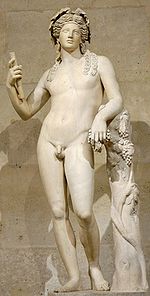 |
God of wine, celebrations and ecstasy. Patron god of the art of theatre Theatre Theatre is a collaborative form of fine art that uses live performers to present the experience of a real or imagined event before a live audience in a specific place. The performers may communicate this experience to the audience through combinations of gesture, speech, song, music or dance... . Symbols include the grapevine, ivy, cup, tiger, panther, leopard, dolphin and goat. Son of Zeus and the mortal Theban princess Semele Semele Semele , in Greek mythology, daughter of the Boeotian hero Cadmus and Harmonia, was the mortal mother of Dionysus by Zeus in one of his many origin myths. In another version of his mythic origin, he is the son of Persephone... . Married to the Cretan princess Ariadne Ariadne Ariadne , in Greek mythology, was the daughter of King Minos of Crete, and his queen Pasiphaë, daughter of Helios, the Sun-titan. She aided Theseus in overcoming the Minotaur and was the bride of the god Dionysus.-Minos and Theseus:... . The youngest Olympian, as well as the only one to have been born of a mortal woman. |
Second |
| Apollo Apollo Apollo is one of the most important and complex of the Olympian deities in Greek and Roman mythology... |
Apollo | 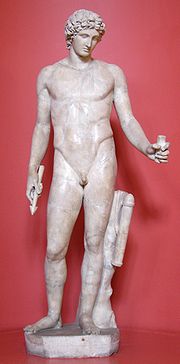 |
God of light, knowledge, music, poetry, prophecy and archery. Symbols include the sun, lyre, bow and arrow, raven, dolphin, wolf, swan and mouse. Twin brother of Artemis. Youngest child of Zeus and Leto Leto In Greek mythology, Leto is a daughter of the Titans Coeus and Phoebe. The island of Kos is claimed as her birthplace. In the Olympian scheme, Zeus is the father of her twins, Apollo and Artemis, the Letoides, which Leto conceived after her hidden beauty accidentally caught the eyes of Zeus... . |
Second |
| Artemis Artemis Artemis was one of the most widely venerated of the Ancient Greek deities. Her Roman equivalent is Diana. Some scholars believe that the name and indeed the goddess herself was originally pre-Greek. Homer refers to her as Artemis Agrotera, Potnia Theron: "Artemis of the wildland, Mistress of Animals"... |
Diana Diana (mythology) In Roman mythology, Diana was the goddess of the hunt and moon and birthing, being associated with wild animals and woodland, and having the power to talk to and control animals. She was equated with the Greek goddess Artemis, though she had an independent origin in Italy... |
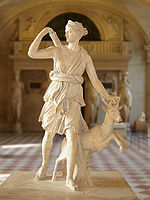 |
Virgin goddess of the hunt, virginity, childbirth, archery and all animals. Symbols include the moon, deer, hound, she-bear, snake, cypress tree and bow and arrow. Twin sister of Apollo. Eldest child of Zeus and Leto Leto In Greek mythology, Leto is a daughter of the Titans Coeus and Phoebe. The island of Kos is claimed as her birthplace. In the Olympian scheme, Zeus is the father of her twins, Apollo and Artemis, the Letoides, which Leto conceived after her hidden beauty accidentally caught the eyes of Zeus... . |
Second |
| Hermes Hermes Hermes is the great messenger of the gods in Greek mythology and a guide to the Underworld. Hermes was born on Mount Kyllini in Arcadia. An Olympian god, he is also the patron of boundaries and of the travelers who cross them, of shepherds and cowherds, of the cunning of thieves, of orators and... |
Mercury Mercury (mythology) Mercury was a messenger who wore winged sandals, and a god of trade, the son of Maia Maiestas and Jupiter in Roman mythology. His name is related to the Latin word merx , mercari , and merces... |
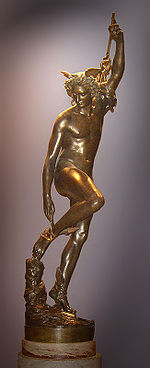 |
Messenger of the gods; god of commerce and thieves. Symbols include the caduceus Caduceus The caduceus is the staff carried by Hermes in Greek mythology. The same staff was also borne by heralds in general, for example by Iris, the messenger of Hera. It is a short staff entwined by two serpents, sometimes surmounted by wings... (staff entwined with two snakes), winged sandals and cap, stork and tortoise (whose shell he used to invent the lyre). Son of Zeus and the nymph Maia. The second-youngest Olympian, just older than Dionysus. He married Dryope Dryope In Greek mythology, Dryope is the name attributed to several distinct figures.-Dryope, lover of Apollo:The most prominent Dryope was the daughter of Dryops, king of Oeta or of Eurytus . She was sometimes thought of as one of the Pleiades . There are two stories of her metamorphosis into a black... , the daughter of Dryops Dryops Dryops may refer to:* Dryops, a genus of beetles in family DryopidaeIn Greek mythology:* Dryops, a son of King Priam of Troy* Dryops , a king of Oeta & son of river-god Spercheus* Dryops, a son of Apollo by Dia... , and their son Pan became the god of nature, lord of the satyrs, inventor of the panpipes and comrade of Dionysus. |
Second |
| Athena Athena In Greek mythology, Athena, Athenê, or Athene , also referred to as Pallas Athena/Athene , is the goddess of wisdom, courage, inspiration, civilization, warfare, strength, strategy, the arts, crafts, justice, and skill. Minerva, Athena's Roman incarnation, embodies similar attributes. Athena is... |
Minerva Minerva Minerva was the Roman goddess whom Romans from the 2nd century BC onwards equated with the Greek goddess Athena. She was the virgin goddess of poetry, medicine, wisdom, commerce, weaving, crafts, magic... |
 |
Virgin goddess of wisdom, handicrafts, defense and strategic warfare. Symbols include the owl and the olive tree. Daughter of Zeus and the Oceanid Oceanid In Greek mythology and, later, Roman mythology, the Oceanids were the three thousand daughters of the Titans Oceanus and Tethys. Each was the patroness of a particular spring, river, sea, lake, pond, pasture, flower or cloud... Metis Metis Metis meant "cunningness" or "wisdom, craft, skill" in Ancient Greek.Metis may also refer to:* Métis people , a mixed-race people of Canada* Metis , a Titaness and the first wife of Zeus... , she rose from her father's head fully grown and in full battle armor after he swallowed her mother. |
Second |
| Ares Ares Ares is the Greek god of war. He is one of the Twelve Olympians, and the son of Zeus and Hera. In Greek literature, he often represents the physical or violent aspect of war, in contrast to the armored Athena, whose functions as a goddess of intelligence include military strategy and... |
Mars Mars (mythology) Mars was the Roman god of war and also an agricultural guardian, a combination characteristic of early Rome. He was second in importance only to Jupiter, and he was the most prominent of the military gods worshipped by the Roman legions... |
 |
God of war, violence and bloodshed. Symbols include the boar, serpent, dog, vulture, spear and shield. Son of Zeus and Hera, all the other gods (excluding Aphrodite) despised him. His Latin name, Mars, gave us the word "martial." | Second |
| Aphrodite Aphrodite Aphrodite is the Greek goddess of love, beauty, pleasure, and procreation.Her Roman equivalent is the goddess .Historically, her cult in Greece was imported from, or influenced by, the cult of Astarte in Phoenicia.... |
Venus Venus (mythology) Venus is a Roman goddess principally associated with love, beauty, sex,sexual seduction and fertility, who played a key role in many Roman religious festivals and myths... |
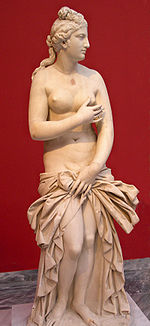 |
Goddess of love, beauty, and desire. Symbols include the dove, bird, apple, bee, swan, myrtle and rose. Daughter of Zeus and the Oceanid Dione, or perhaps born from the sea foam after Uranus Uranus (mythology) Uranus , was the primal Greek god personifying the sky. His equivalent in Roman mythology was Caelus. In Ancient Greek literature, according to Hesiod in his Theogony, Uranus or Father Sky was the son and husband of Gaia, Mother Earth... ' blood dripped onto the earth and into the sea after being defeated by his youngest son Cronus Cronus In Greek mythology, Cronus or Kronos was the leader and the youngest of the first generation of Titans, divine descendants of Gaia, the earth, and Uranus, the sky... . Married to Hephaestus, although she had many adulterous affairs, most notably with Ares. Her name gave us the word "aphrodisiac Aphrodisiac An aphrodisiac is a substance that increases sexual desire. The name comes from Aphrodite, the Greek goddess of sexuality and love. Throughout history, many foods, drinks, and behaviors have had a reputation for making sex more attainable and/or pleasurable... ". |
|
| Hephaestus Hephaestus Hephaestus was a Greek god whose Roman equivalent was Vulcan. He is the son of Zeus and Hera, the King and Queen of the Gods - or else, according to some accounts, of Hera alone. He was the god of technology, blacksmiths, craftsmen, artisans, sculptors, metals, metallurgy, fire and volcanoes... |
Vulcan Vulcan (mythology) Vulcan , aka Mulciber, is the god of beneficial and hindering fire, including the fire of volcanoes in ancient Roman religion and Roman Neopaganism. Vulcan is usually depicted with a thunderbolt. He is known as Sethlans in Etruscan mythology... |
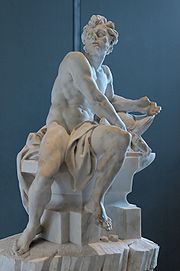 |
Master blacksmith and craftsman of the gods; god of fire and the forge. Symbols include fire, anvil, ax, donkey, hammer, tongs and quail. Son of Hera, either by Zeus or alone. After he was born, his parents threw him off Mount Olympus, and he landed on the island of Lemnos. Married to Aphrodite, though unlike most divine husbands, he was rarely ever licentious. His Latin name, Vulcan, gave us the word "volcano Volcano 2. Bedrock3. Conduit 4. Base5. Sill6. Dike7. Layers of ash emitted by the volcano8. Flank| 9. Layers of lava emitted by the volcano10. Throat11. Parasitic cone12. Lava flow13. Vent14. Crater15... ." |
Second |
| Demeter Demeter In Greek mythology, Demeter is the goddess of the harvest, who presided over grains, the fertility of the earth, and the seasons . Her common surnames are Sito as the giver of food or corn/grain and Thesmophoros as a mark of the civilized existence of agricultural society... |
Ceres Ceres (mythology) In ancient Roman religion, Ceres was a goddess of agriculture, grain crops, fertility and motherly relationships. She was originally the central deity in Rome's so-called plebeian or Aventine Triad, then was paired with her daughter Proserpina in what Romans described as "the Greek rites of Ceres"... |
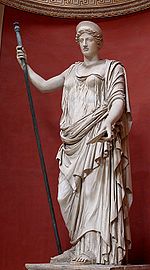 |
Goddess of fertility, agriculture, nature, and the seasons. Symbols include the poppy, wheat, torch, and pig. Middle daughter of Cronus and Rhea. Her Latin name, Ceres, gave us the word "cereal Cereal Cereals are grasses cultivated for the edible components of their grain , composed of the endosperm, germ, and bran... ". |
First |
- Romans also associated Phoebus with HeliosHeliosHelios was the personification of the Sun in Greek mythology. Homer often calls him simply Titan or Hyperion, while Hesiod and the Homeric Hymn separate him as a son of the Titans Hyperion and Theia or Euryphaessa and brother of the goddesses Selene, the moon, and Eos, the dawn...
and the sunSunThe Sun is the star at the center of the Solar System. It is almost perfectly spherical and consists of hot plasma interwoven with magnetic fields...
itself. However, they also used the name legaced by the Greeks, Apollo.
- According to an alternate version of her birth, Aphrodite was born of UranusUranus (mythology)Uranus , was the primal Greek god personifying the sky. His equivalent in Roman mythology was Caelus. In Ancient Greek literature, according to Hesiod in his Theogony, Uranus or Father Sky was the son and husband of Gaia, Mother Earth...
, Zeus' grandfather, — after CronusCronusIn Greek mythology, Cronus or Kronos was the leader and the youngest of the first generation of Titans, divine descendants of Gaia, the earth, and Uranus, the sky...
threw his castrated genitals into the sea. This supports the etymology of her name, "foam-born". As such, Aphrodite would belong to the same generation as Cronus, Zeus' father, and would technically be Zeus' aunt. See the birth of Aphrodite
Notes
Other definitions
The following gods and goddess are sometimes mentioned amongst the twelve Olympians.| Greek Name | |Image | |Generation | ||
|---|---|---|---|---|
| Hades Hades Hades , Hadēs, originally , Haidēs or , Aidēs , meaning "the unseen") was the ancient Greek god of the underworld. The genitive , Haidou, was an elision to denote locality: "[the house/dominion] of Hades". Eventually, the nominative came to designate the abode of the dead.In Greek mythology, Hades... |
Pluto Pluto (mythology) In ancient Greek religion and myth, Pluto was a name for the ruler of the underworld; the god was also known as Hades, a name for the underworld itself... |
God of the Underworld, dead and the riches under the Earth ("Pluto" translates to "The Rich One"); he was born into the first Olympian generation, but as he lives in the Underworld rather than on Mount Olympus, he is typically not included amongst the twelve Olympians. | First | |
| Hestia Hestia In Greek mythology Hestia , first daughter of Cronus and Rhea , is the virgin goddess of the hearth, architecture, and of the right ordering of domesticity and the family. She received the first offering at every sacrifice in the household. In the public domain, the hearth of the prytaneum... |
Vesta Vesta (mythology) Vesta was the virgin goddess of the hearth, home, and family in Roman religion. Vesta's presence was symbolized by the sacred fire that burned at her hearth and temples... |
Goddess of the hearth and of the right ordering of domesticity and the family; she was born into the first Olympian generation and was one of the original twelve Olympians, but stories suggest that when Dionysus arrived on Mount Olympus she gave him her place in the twelve to prevent discord. | First | |
| Asclepius Asclepius Asclepius is the God of Medicine and Healing in ancient Greek religion. Asclepius represents the healing aspect of the medical arts; his daughters are Hygieia , Iaso , Aceso , Aglæa/Ægle , and Panacea... |
Vejovis | The god of medicine and healing. He represents the healing aspect of the medical arts; his daughters are Hygieia ("Hygiene"), Iaso ("Medicine"), Aceso ("Healing"), Aglæa/Ægle ("Healthy Glow"), and Panacea ("Universal Remedy"). | Third | |
| Eros Eros Eros , in Greek mythology, was the Greek god of love. His Roman counterpart was Cupid . Some myths make him a primordial god, while in other myths, he is the son of Aphrodite.... |
Cupid Cupid In Roman mythology, Cupid is the god of desire, affection and erotic love. He is the son of the goddess Venus and the god Mars. His Greek counterpart is Eros... |
The god of sexual love and beauty. He was also worshipped as a fertility deity, son of Aphrodite Aphrodite Aphrodite is the Greek goddess of love, beauty, pleasure, and procreation.Her Roman equivalent is the goddess .Historically, her cult in Greece was imported from, or influenced by, the cult of Astarte in Phoenicia.... and Ares Ares Ares is the Greek god of war. He is one of the Twelve Olympians, and the son of Zeus and Hera. In Greek literature, he often represents the physical or violent aspect of war, in contrast to the armored Athena, whose functions as a goddess of intelligence include military strategy and... . He was depicted often as carrying a lyre Lyre The lyre is a stringed musical instrument known for its use in Greek classical antiquity and later. The word comes from the Greek "λύρα" and the earliest reference to the word is the Mycenaean Greek ru-ra-ta-e, meaning "lyrists", written in Linear B syllabic script... or bow and arrow. He is often accompanied by dolphins, roses and torches. |
||
| Hebe Hebe (mythology) In Greek mythology, Hēbē is the goddess of youth . She is the daughter of Zeus and Hera. Hebe was the cupbearer for the gods and goddesses of Mount Olympus, serving their nectar and ambrosia, until she was married to Heracles ; her successor was the young Trojan prince Ganymede... |
Juventas | 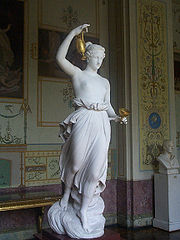 |
She is the daughter of Zeus and Hera. Hebe was the cupbearer for the gods and goddesses of Mount Olympus, serving their nectar and ambrosia, until she was married to Heracles. | Second |
| Heracles Heracles Heracles ,born Alcaeus or Alcides , was a divine hero in Greek mythology, the son of Zeus and Alcmene, foster son of Amphitryon and great-grandson of Perseus... |
Hercules | A divine hero, the son of Zeus and Alcmene, foster son of Amphitryon and great-grandson (and half-brother) of Perseus (Περσεύς). He was the greatest of the Greek heroes, a paragon of masculinity and a champion of the Olympian order against chthonic monsters. | Second | |
| Pan | Faunus Faunus In ancient Roman religion and myth, Faunus was the horned god of the forest, plains and fields; when he made cattle fertile he was called Inuus. He came to be equated in literature with the Greek god Pan.... /Sylvananous |
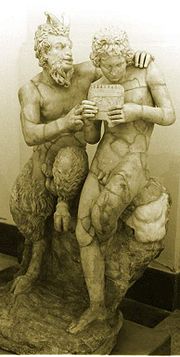 |
The god of the wild, shepherds and flocks, of mountain wilds, hunting and rustic music, as well as the companion of the nymphs. | |
| Persephone Persephone In Greek mythology, Persephone , also called Kore , is the daughter of Zeus and the harvest-goddess Demeter, and queen of the underworld; she was abducted by Hades, the god-king of the underworld.... |
Proserpina Proserpina Proserpina or Proserpine is an ancient Roman goddess whose story is the basis of a myth of Springtime. Her Greek goddess' equivalent is Persephone. The probable origin of her name comes from the Latin, "proserpere" or "to emerge," in respect to the growing of grain... |
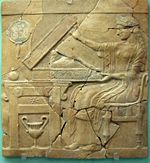 |
Queen of the Underworld and a daughter of Demeter and Zeus. She became the consort of Hades when he became the deity who governed the underworld. Also goddess of spring time. She was kidnapped by Hades. The winter season was created when Demeter was mourning the disappearance of her daughter, and in her distraction, neglected the earth, creating its cycles. Demeter mourned her by not allowing crops to grow, so Zeus struck a deal with Hades allowing Persephone to leave the underworld and rejoin her mother for six months each year (spring/summer). | Second |
Close to the Olympians
The following gods, goddesses, and demigodDemigod
The term "demigod" , meaning "half-god", is commonly used to describe mythological figures whose one parent was a god and whose other parent was human; as such, demigods are human-god hybrids...
s were not usually counted as Olympians, although they had close ties to them.
- AeolusAeolusAeolus was the ruler of the winds in Greek mythology. In fact this name was shared by three mythic characters. These three personages are often difficult to tell apart, and even the ancient mythographers appear to have been perplexed about which Aeolus was which...
- King of the winds, keeper of the Anemoi, master of the seasonal winds. - AmphitriteAmphitriteIn ancient Greek mythology, Amphitrite was a sea-goddess and wife of Poseidon. Under the influence of the Olympian pantheon, she became merely the consort of Poseidon, and was further diminished by poets to a symbolic representation of the sea...
- Queen of the Sea, wife of Poseidon. - AnemoiAnemoiIn Greek mythology, the Anemoi were Greek wind gods who were each ascribed a cardinal direction from which their respective winds came , and were each associated with various seasons and weather conditions...
– Wind gods consisting of Boreas (north), Notus (south), Zephyrus (west), and Eurus (east). - AuraAura (mythology)In Greek and Roman mythology, Aura is the divine personification of the breeze. The plural form, Aurae, "Breezes," is often found.The velificatio, a billowing garment that forms an arch overhead, is the primary attribute by which an Aura can be identified in art...
- Goddess of cool breezes and fresh air. - BiaBia (mythology)In Greek mythology, Bia was the personification of force, daughter of Pallas and Styx. She was the sister of Nike, Kratos, and Zelus; she and her siblings were constant companions of Zeus. They achieved this honour after supporting Zeus in the war against the Titans along with their mother...
– Personification of violence. - CirceCirceIn Greek mythology, Circe is a minor goddess of magic , described in Homer's Odyssey as "The loveliest of all immortals", living on the island of Aeaea, famous for her part in the adventures of Odysseus.By most accounts, Circe was the daughter of Helios, the god of the sun, and Perse, an Oceanid...
- minor goddess of magic, not to be confused with Hecate. - DeimosDeimos (mythology)In Greek mythology, Deimos was the personification of terror.He was the son of Ares and Aphrodite. He is the twin brother of Phobos and the goddess Enyo who accompanied Ares into battle, as well as his father's attendants, Trembling, Fear, Dread, and Panic...
- God of terror, brother of Phobos. - DioneDione (mythology)Dione was a Greek goddess primarily known as the mother of Aphrodite in Book V of Homer's Iliad. Aphrodite journeys to Dione's side after she has been wounded in battle protecting her favorite son Aeneas. In this episode, Dione seems to be the equivalent of the earth goddess Gaia, whom Homer also...
– Oceanid; Mother of Aphrodite by Zeus in HomerHomerIn the Western classical tradition Homer , is the author of the Iliad and the Odyssey, and is revered as the greatest ancient Greek epic poet. These epics lie at the beginning of the Western canon of literature, and have had an enormous influence on the history of literature.When he lived is...
's version. - Eileithyia – Goddess of childbirth; daughter of Hera and Zeus.
- EnyoEnyoEnyo , was an ancient goddess of war, acting as a counterpart and companion to the war god Ares. She is also identified as his sister, and daughter of Zeus and Hera, in a role closely resembling that of Eris; with Homer representing the two as the same goddess...
- An ancient goddess of warfare, companion of Ares. - EosEosIn Greek mythology, Eos is the Titan goddess of the dawn, who rose from her home at the edge of Oceanus, the ocean that surrounds the world, to herald her brother Helios, the Sun.- Greek literature :...
– Personification of dawn. - ErisEris (mythology)Eris is the Greek goddess of strife and discord, her name being translated into Latin as Discordia. Her Greek opposite is Harmonia, whose Latin counterpart is Concordia. Homer equated her with the war-goddess Enyo, whose Roman counterpart is Bellona...
– Goddess of discord and strife. - GanymedeGanymede (mythology)In Greek mythology, Ganymede is a divine hero whose homeland was Troy. Homer describes Ganymede as the most beautiful of mortals. In the best-known myth, he is abducted by Zeus, in the form of an eagle, to serve as cup-bearer in Olympus. Some interpretations of the myth treat it as an allegory of...
– Cupbearer of the god's palace at Olympus. - GracesCharitesIn Greek mythology, a Charis is one of several Charites , goddesses of charm, beauty, nature, human creativity and fertility. They ordinarily numbered three, from youngest to oldest: Aglaea , Euphrosyne , and Thalia . In Roman mythology they were known as the Gratiae, the "Graces"...
- Goddesses of beauty and attendants of Aphrodite and Hera. - HarmoniaHarmonia (mythology)In Greek mythology, Harmonia is the immortal goddess of harmony and concord. Her Roman counterpart is Concordia, and her Greek opposite is Eris, whose Roman counterpart is Discordia.-Origins:...
- Goddess of concord and harmony, opposite of Eris, daughter of Aphrodite. - HecateHecateHecate or Hekate is a chthonic Greco-Roman goddess associated with magic, witchcraft, necromancy, and crossroads.She is attested in poetry as early as Hesiod's Theogony...
- Goddess associated with magic, witches and crossroads. - HeliosHeliosHelios was the personification of the Sun in Greek mythology. Homer often calls him simply Titan or Hyperion, while Hesiod and the Homeric Hymn separate him as a son of the Titans Hyperion and Theia or Euryphaessa and brother of the goddesses Selene, the moon, and Eos, the dawn...
- Titan; personification of the sun. - HoraeHoraeIn Greek mythology the Horae or Hours were the goddesses of the seasons and the natural portions of time. They were originally the personifications of nature in its different seasonal aspects, but in later times they were regarded as goddessess of order in general and natural justice...
– Wardens of Olympus. - HypnosHypnosIn Greek mythology, Hypnos was the personification of sleep; the Roman equivalent was known as Somnus. His twin was Thánatos ; their mother was the primordial goddess Nyx . His palace was a dark cave where the sun never shines. At the entrance were a number of poppies and other hypnogogic plants...
- God of sleep, father of Morpheus and son of Nyx. - IrisIris (mythology)In Greek mythology, Iris is the personification of the rainbow and messenger of the gods. As the sun unites Earth and heaven, Iris links the gods to humanity...
– Personification of the Rainbow, also the messenger of Olympus along with Hermes. - Kratos – Personification of power.
- LetoLetoIn Greek mythology, Leto is a daughter of the Titans Coeus and Phoebe. The island of Kos is claimed as her birthplace. In the Olympian scheme, Zeus is the father of her twins, Apollo and Artemis, the Letoides, which Leto conceived after her hidden beauty accidentally caught the eyes of Zeus...
– Titaness; the mother of Apollo and Artemis. - MoiraeMoiraeThe Moirae, Moerae or Moirai , in Greek mythology, were the white-robed incarnations of destiny . Their number became fixed at three...
- Goddesses of destiny and a lotters of fate, more powerful than Zeus. - MomusMomusMomus or Momos was in Greek mythology the god of satire, mockery, censure, writers, poets; a spirit of evil-spirited blame and unfair criticism. His name is related to , meaning 'blame' or 'censure'. He is depicted in classical art as lifting a mask from his face.-In classical literature:Hesiod...
- God of satire, mockery, satires, and poets. - MorpheusMorpheus (mythology)Morpheus in Greek mythology is the god of dreams, leader of the Oneiroi. Morpheus has the ability to take any human form and appear in dreams...
– God of dreams. - MuseMuseThe Muses in Greek mythology, poetry, and literature, are the goddesses who inspire the creation of literature and the arts. They were considered the source of the knowledge, related orally for centuries in the ancient culture, that was contained in poetic lyrics and myths...
s – Nine ladies of science and arts. - NemesisNemesis (mythology)In Greek mythology, Nemesis , also called Rhamnousia/Rhamnusia at her sanctuary at Rhamnous, north of Marathon, was the spirit of divine retribution against those who succumb to hubris . The Greeks personified vengeful fate as a remorseless goddess: the goddess of revenge...
– Greek goddess of retribution and revenge. - NikeNike (mythology)In Greek mythology, Nike was a goddess who personified victory, also known as the Winged Goddess of Victory. The Roman equivalent was Victoria. Depending upon the time of various myths, she was described as the daughter of Pallas and Styx and the sister of Kratos , Bia , and Zelus...
– Goddess of victory. - NyxNyxIn Greek mythology, Nyx was the primordial goddess of the night. A shadowy figure, Nyx stood at or near the beginning of creation, and was the mother of personified gods such as Hypnos and Thánatos...
- Goddess of night. - Paean – Physician of the gods.
- PerseusPerseusPerseus ,Perseos and Perseas are not used in English. the legendary founder of Mycenae and of the Perseid dynasty of Danaans there, was the first of the mythic heroes of Greek mythology whose exploits in defeating various archaic monsters provided the founding myths of the Twelve Olympians...
– Son of Zeus, slayer of Medusa, the legendary founder of MycenaeMycenaeMycenae is an archaeological site in Greece, located about 90 km south-west of Athens, in the north-eastern Peloponnese. Argos is 11 km to the south; Corinth, 48 km to the north...
and of the Perseid dynasty. - PhobosPhobos (mythology)Phobos is the personification of horror in Greek mythology. He is the offspring of Ares and Aphrodite. He was known for accompanying Ares into battle along with his brother, Deimos, the goddess Enyo, and his father’s attendants. Timor is his Roman equivalent...
- God of fear, brother of Deimos. - SeleneSeleneIn Greek mythology, Selene was an archaic lunar deity and the daughter of the Titans Hyperion and Theia. In Roman mythology, the moon goddess is called Luna, Latin for "moon"....
– Titaness; personification of the moon. - StyxStyxIn Greek mythology the Styx is the river that forms the boundary between the underworld and the world of the living, as well as a goddess and a nymph that represents the river.Styx may also refer to:-Popular culture:...
- Goddess of the River Styx, the river where gods swear oaths on. - ThanatosThanatosIn Greek mythology, Thanatos was the daemon personification of death. He was a minor figure in Greek mythology, often referred to but rarely appearing in person...
- God of Death. - TheseusTheseusFor other uses, see Theseus Theseus was the mythical founder-king of Athens, son of Aethra, and fathered by Aegeus and Poseidon, both of whom Aethra had slept with in one night. Theseus was a founder-hero, like Perseus, Cadmus, or Heracles, all of whom battled and overcame foes that were...
- Son of Poseidon, first Hero of Athens and slayer of the MinotaurMinotaurIn Greek mythology, the Minotaur , as the Greeks imagined him, was a creature with the head of a bull on the body of a man or, as described by Roman poet Ovid, "part man and part bull"...
. - TritonTriton (mythology)Triton is a mythological Greek god, the messenger of the big sea. He is the son of Poseidon, god of the sea, and Amphitrite, goddess of the sea, whose herald he is...
- Messenger of the Seas, Son of Poseidon and Amphitrite. He holds a twisted conch shell. - TycheTycheIn ancient Greek city cults, Tyche was the presiding tutelary deity that governed the fortune and prosperity of a city, its destiny....
- Goddess of Luck. - ZelusZelusIn Greek mythology, Zelus was the son of Pallas and Styx. Zelus and siblings Nike , Kratos and Bia were winged enforcers who stood in attendance at Zeus' throne and formed part of his retinue....
– Personification of Emulation.
See also
- Ancient Greek religionAncient Greek religionGreek religion encompasses the collection of beliefs and rituals practiced in ancient Greece in the form of both popular public religion and cult practices. These different groups varied enough for it to be possible to speak of Greek religions or "cults" in the plural, though most of them shared...
- Dii ConsentesDii ConsentesThe Dii Consentes were a list of twelve major deities, six gods and six goddesses, in the pantheon of Ancient Rome. Their gilt statues stood in the Forum, later apparently in the Porticus Deorum Consentium....
(its equivalent on the pantheon of Ancient Rome) - Family tree of the Greek godsFamily tree of the Greek godsKey: The essential Olympians' names are given in bold font.Key: The Names marked in green are the titans...
- Greek mythologyGreek mythologyGreek mythology is the body of myths and legends belonging to the ancient Greeks, concerning their gods and heroes, the nature of the world, and the origins and significance of their own cult and ritual practices. They were a part of religion in ancient Greece...
- List of Greek mythological characters
- Supreme Council of Ethnikoi HellenesSupreme Council of Ethnikoi HellenesThe Supreme Council of Ethnikoi Hellenes , commonly known as YSEE, is a non-profit umbrella organisation in Greece established in 1997 to defend and restore the ethnic, polytheistic, Hellenic tradition, religion and way in contemporary Greek society...

